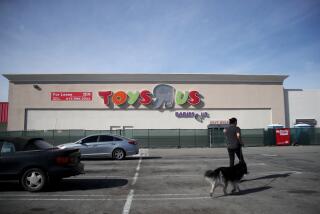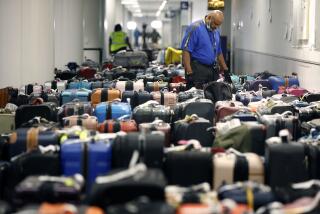Unions May Hold Key to TWA Future : Airlines: Offers of concessions may tip the battle for control of the ailing carrier in favor of Kerkorian over Icahn.
- Share via
NEW YORK — When eccentric billionaire Howard Hughes owned Trans World Airlines, it ranked with United and American as part of the nation’s airborne “Big Three.” All were highly profitable.
Today, as a skeletal TWA struggles for survival, two latter-day moguls are fighting for control of its uncertain future. The airline’s labor unions might ultimately determine the outcome of the fray.
In one corner of the ring is Beverly Hills billionaire Kirk Kerkorian, who has had a passion for airlines for most of his life. To be sure, he’s no Howard Hughes, but his reclusive ways have caused some to make the comparison.
In the other corner is Carl C. Icahn, a tough, often crude investor who is disliked by even some of his closest co-workers. He got control of TWA in the mid-l980s, ran it profitably for a while, then took it private in a leveraged buyout. TWA subsequently started a downhill slide.
TWA’s pilots and other employees are backing Kerkorian, hoping to rescue the airline and safeguard their jobs. They have promised him $137 million in concessions. Beyond that, no details of the Kerkorian-union proposal have been revealed.
The labor groups also want to have more of a say in the running of TWA.
“I think they feel they are being yanked around by the financial decisions of the Icahn group,” said Peter Cappelli, management professor at the Wharton School of the University of Pennsylvania. “As a result, they are not productive for the airline. They want to simply create a situation where they have influence on decisions. They would like to install a management team that will accept the principles of collective bargaining in important situations.”
There’s a certain irony to what the unions are doing now. Back in the mid-1980s, Frank Lorenzo, archenemy of labor, had all but taken over TWA. The unions brought in Icahn to rescue them, gave him concessions in return for a 10% chunk of the carrier but ultimately concluded they had been duped.
“They feel he has used TWA as a takeover vehicle for his own financial dealings,” said Joseph Blasi, professor in the Institute of Management and Labor Relations at Rutgers University. “They feel he has not devoted himself completely to building up the company. They have been trying to get rid of him for years.”
Observers say that Kerkorian, who has agreed with the unions to make a bid for the ailing airline, has several reasons for wanting to invest in TWA.
For one thing, they maintain that with significant concessions from the labor groups--the pilots, machinists and flight attendants--Kerkorian figures he can get TWA for a song (he has promised to invest $250 million), make it profitable and resell it at a high price.
“I suspect that Kerkorian is hoping to get a valuable property below market price,” said Donald S. Garvett, vice president of Simat, Helliesen & Eichner Inc., an aviation consulting firm.
Others think that Kerkorian’s ego is at the heart of it. He really wants to operate another airline, they say. It’s in his blood. He served in the British Royal Air Force in World War II; after the war, he bought used military C-47s in Hawaii and ferried them to California and sold them; he flew gamblers to Las Vegas; He founded Trans International Airlines; he became the major shareholder of Western Airlines. He tried recently to get a chunk of Pan American World Airways when it filed for bankruptcy. Today, Kerkorian owns a small, exclusive carrier, MGM Grand Air, which he might want to mesh into TWA.
“He knows the industry,” said Hans J. Plickert, airline analyst with the Transportation Group, an affiliate of Paine Webber. “He probably feels that with the concessions he might get from the unions (and) creditors, he can resurrect TWA. But there are lots and lots of ifs in this proposition.”
And the man who heads MGM Grand for Kerkorian agrees. Alex Yemenidjian said “Kirk is going to pour money into TWA in an effort to save a flagship carrier. Hopefully, it will be a good economic deal for him.”
But much will be required of Kerkorian if he ends up as TWA’s chief pilot.
“TWA has a lousy image with the traveling public and it has other problems that are enormous,” said Scott Hamilton, editor of Commercial Aviation Report, an aircraft and capital finance publication. “It is badly in debt. Its employee morale is poor. It has an old fleet. It has money-losing operations. It has a weak management team. If he leaves, all of Icahn’s management cronies will go with him and Kerkorian will have to find a whole new credible team, a team that would also be able to gain credibility on Wall Street. It will take years to straighten out the mess.”
Icahn, of course, has his own set of motivations. Having recovered his initial investment in the airline, he probably wants to get on to other things.
“He would get rid of a massive headache,” said Hamilton. “That is probably the biggest benefit.”
Some analysts maintain that Icahn’s intention now is to reap the maximum amount of cash out of what’s left of TWA.
“Carl wants to sell it piecemeal,” said Paul Turk, analyst for Avmark Inc., an Arlington, Va., airline consulting firm. “It’s like taking a car apart and selling the parts. You get much more for each one.”
Icahn has angrily called Kerkorian a “spoiler.”
His proposed deal with the unions would wreck Icahn’s earlier agreement to sell most of TWA’s London routes to American Airlines. That sale still awaits approval by the Transportation Department. But Kerkorian has said he is not interested in investing in TWA without the American routes.
More to Read
Inside the business of entertainment
The Wide Shot brings you news, analysis and insights on everything from streaming wars to production — and what it all means for the future.
You may occasionally receive promotional content from the Los Angeles Times.










